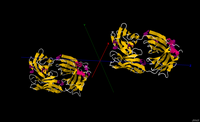
Photo from wikipedia
Abstract Purpose: We investigated the relationships between KRAS gene status and local tumor progression (LTP) of colorectal liver metastases (CLMs) after treatment with percutaneous ultrasound-guided radiofrequency ablation (RFA). Materials and… Click to show full abstract
Abstract Purpose: We investigated the relationships between KRAS gene status and local tumor progression (LTP) of colorectal liver metastases (CLMs) after treatment with percutaneous ultrasound-guided radiofrequency ablation (RFA). Materials and methods: Clinical and imaging data from 76 patients (154 lesions) with CLM who underwent percutaneous ultrasound-guided RFA and had KRAS gene test results between January 2012 and June 2016 were analyzed. The average lesion size was 2.3 ± 1.0 cm (range 0.9–5.7 cm); 38 cases (82 lesions) had wild-type KRAS, and 38 cases (72 lesions) had KRAS mutations. Results: The technique effectiveness was 98.1% (151/154), and the LTP rate was 18.2% (28/154) after RFA, which was performed between January 2012 and November 2017. The mean and median follow-up were 32.7 ± 2.5 and 32.0 ± 2.6 months (range 1–70 months), respectively. Cumulative LTP rates at 6 months and 1, 2 and 3 years post-RFA for all patients were 7.4, 14.5, 17.8 and 19.2%, respectively. The LTP rate for patients with mutant KRAS (27.8% [20/72]) was significantly higher than that in patients with wild-type KRAS (9.8% [8/82]; p = .004). The cumulative LTP rates at 6 months and 1, 2 and 3 years post-RFA were 4.0, 11.1, 11.1 and 11.1%, respectively, for patients with wild-type KRAS and 11.2, 18.4, 25.2 and 36.2%, respectively, for patient with mutant KRAS (p = .011). Univariate (p = .011) and multivariate analyses (p = .005) showed that KRAS genotype in liver metastases was predictive of LTP. Multivariate analysis also showed that ablation margin size (p< .001) and modified clinical risk score (CRS; p = .033) were independent prognostic factors for LTP. Conclusions: KRAS gene status of liver metastatic lesions was associated with LTP rates after RFA of CLM. Ablation margin size and modified CRS were also independent prognostic factors for LTP.
Journal Title: International Journal of Hyperthermia
Year Published: 2019
Link to full text (if available)
Share on Social Media: Sign Up to like & get
recommendations!